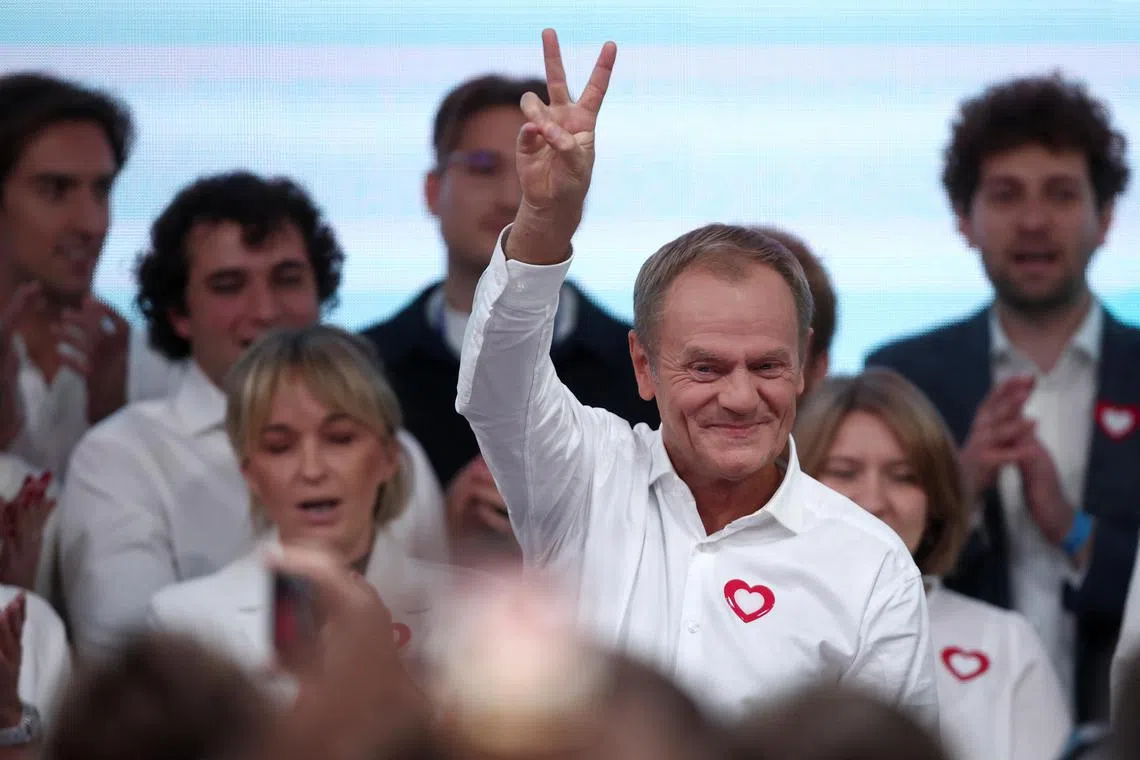Poland’s pro-EU opposition set for majority, exit poll shows
Sign up now: Get ST's newsletters delivered to your inbox

Civic Coalition leader Donald Tusk - a former European Council president - speaks during an election night rally in Warsaw.
PHOTO: REUTERS
WARSAW – Poland’s opposition is on track for a majority in Sunday’s election, an exit poll showed, an upset that would deny the ruling nationalists a third term and steer the country back into the European mainstream.
The Civic Coalition under former European Council president Donald Tusk won 32 per cent of the vote, according to the Ipsos survey for the country’s main broadcasters.
The Third Way alliance had 13 per cent, with the Left party at 8.6 per cent, giving the three groups 248 seats in the 460-strong lower house of parliament.
The poll put turnout at an estimated 73 per cent, an all-time record.
Victory for the opposition would end a tumultuous period in Poland’s relationship with the European Union, which has withheld more than €35 billion (S$50 billion) to punish Warsaw for curbing the independence of judges and the media during eight years of Law & Justice rule. The zloty gained after the result was announced.
“This is the end of the bad times, the end of Law & Justice rule,” Mr Tusk told jubilant supporters in Warsaw, after exit poll results were announced. “Poland won, democracy won.”
The ruling Law & Justice party took the most votes with 37 per cent, a result that would in theory give it the first shot at forming a coalition. But that will prove fruitless as long as Mr Tusk’s allies have a blocking majority.
A potential Law & Justice ally, the far-right Confederation party, took just 6.2 per cent of the vote.
Law & Justice leader Jaroslaw Kaczynski called the result a “victory,” though said a third term for the nationalists was in doubt.
“This we don’t know yet,” he told supporters.
When Law & Justice came to power in 2015, Poland was seen as a poster child for Europe’s post-communist transformation, but since then it has stacked the top court with allies and used the state broadcaster to pump out government propaganda.
A win for Mr Tusk would also mark a shift in the tide of populist forces in Europe. Slovakia’s Robert Fico, a former premier and ally of Hungarian Prime Minister Viktor Orban, is set to return to power this month
Poland has been polarised by an election campaign that featured vicious personal attacks traded between Mr Tusk and Law & Justice leader Jaroslaw Kaczynski. Mr Tusk was accused by the ruling party of being too cosy with Moscow – and of taking orders from Berlin.
In government, Mr Tusk would face a challenge in unifying parties whose differences prevented them from running on a joint platform in the election.
He would also contend with a head of state, Mr Andrzej Duda, who is a former Law & Justice member able to veto legislation.
Monetary policy would also likely be impacted, since the central bank governor, Mr Adam Glapinski, has close ties to the ruling party and was accused last month of seeking to tilt the playing field with an outsized interest-rate cut ahead of the vote. BLOOMBERG


